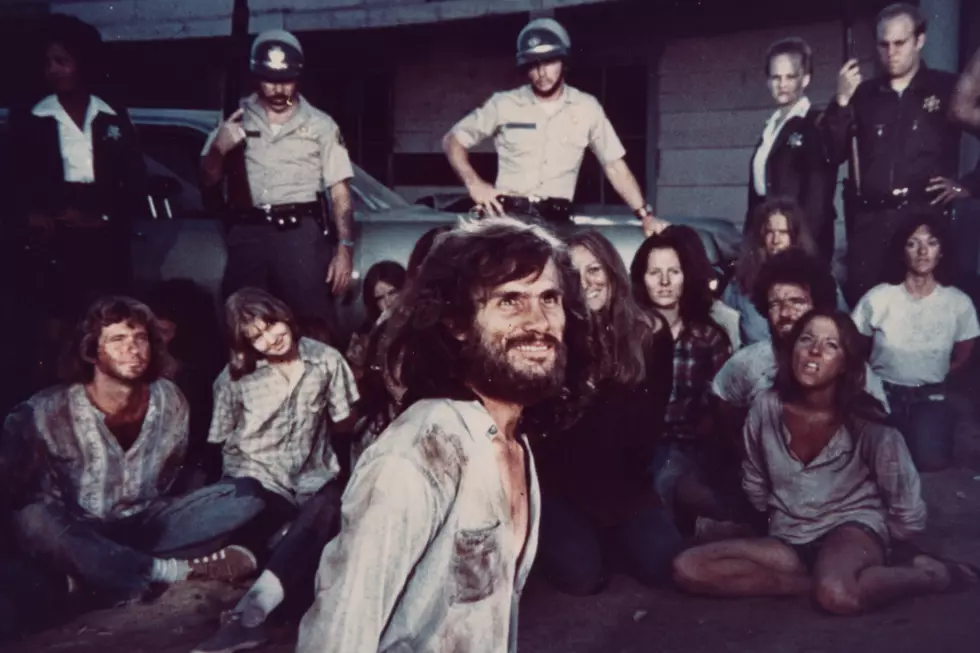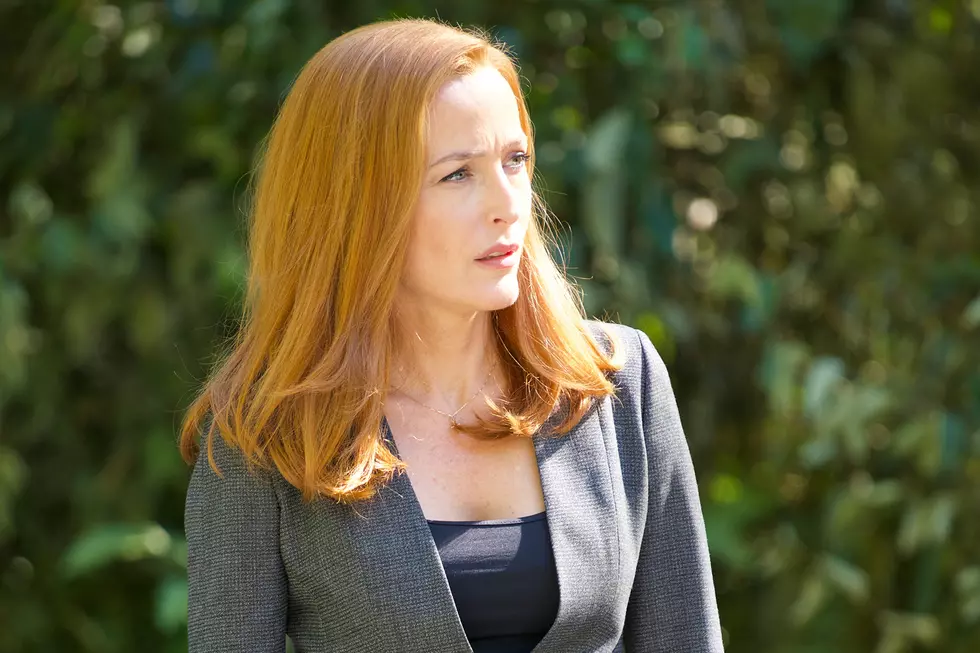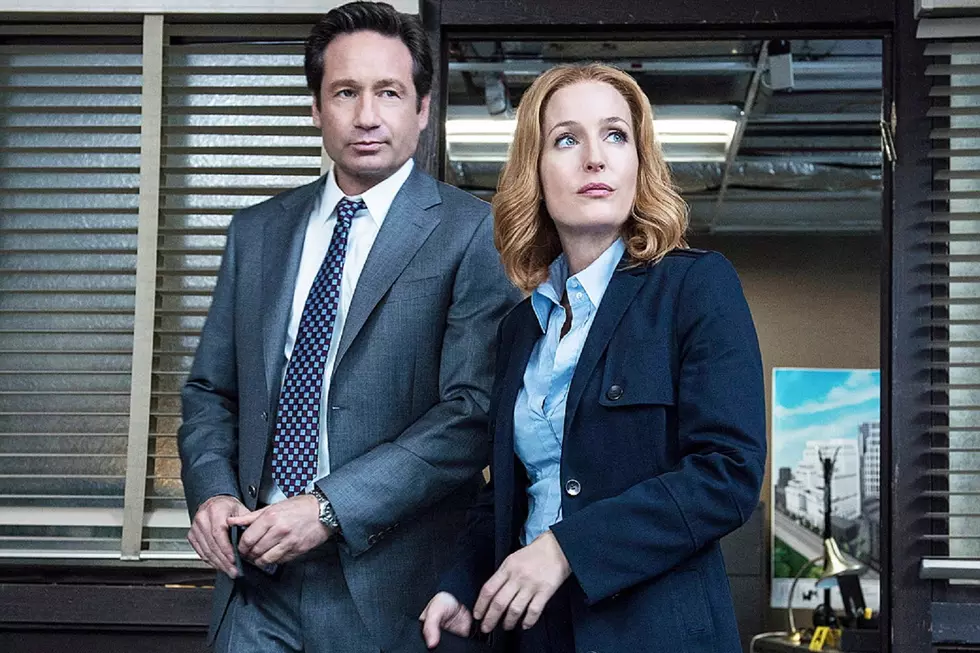
From ‘Helter Skelter’ to ‘Aquarius’, A Look Back at Charles Manson in Movies and TV
Unlike most fictional foils on television, Charles Manson is a name with which you’re already familiar. It’s a name that holds a certain sinister power, making the fictive version of the notorious maniac incredibly unnerving before he even hits the screen in Aquarius, NBC’s detective drama starring David Duchovny as an LAPD investigator whose latest case puts him face to face with the murderous Manson family. The first season of Aquarius hits DVD and Blu-ray today, and to honor the release we’re looking back at the film and television history of one of America’s most notorious criminals.
Helter Skelter (1976)
Most film and television versions of Charles Manson are based on Vincent Bugliosi’s acclaimed non-fiction book Helter Skelter, which provides the most detailed look at the cult mastermind to date via Bugliosi’s involvement with Manson’s prosecution. Manson allegedly never killed anyone himself, and instead incited his followers (known as his “family”) to murder based on his concept of “Helter Skelter,” a title Manson borrowed from The Beatles’ song of the same name and which he used to describe an impending apocalyptic race war.
The 1976 film Helter Skelter debuted on CBS as a two-night event, just seven years after the Manson family enacted a notorious series of murders, claiming the lives of several people including actress Sharon Tate. Although it is somewhat dated now, Helter Skelter is one of the better Manson films, featuring cult actor Steve Railsback in the role of the criminal mastermind. The Manson murders were still weighing heavily on the minds of Americans by the time Helter Skelter debuted, lending this TV film a more surreal and unnerving quality than those that came after.
It also had the benefit of including Bugliosi as a character, which not only gave the movie a procedural element more appealing to casual viewers, but also helped keep the story rooted in the real world and gave viewers the perspective of a protagonist with whom they could identify.
Summer Dreams: The Story of the Beach Boys (1990)
This TV film based on an unauthorized biography briefly explores the relationship between Beach Boys member Dennis Wilson and Charles Manson. Wilson first encountered Manson after meeting two of his followers, and soon became infatuated with the group. Manson is played in the slight ABC TV biopic by Michael Reid MacKay, who gives a rather cartoonish performance in the role of the madman. These broad depictions of Manson are fairly common in pop culture, but Manson himself made it pretty easy to mimic his wild-eyed, unkempt style.
The Ben Stiller Show (1992)
Bob Odenkirk portrayed Charles Manson on the sadly short-lived Ben Stiller Show, which ran on FOX from 1992 to 1993. Odenkirk actually played Manson in a couple of different sketches — in one, Stiller & Co. satirized the classic family TV series Lassie, with Odenkirk’s primitive Manson serving as Timmy’s pet and sharing hilarious thoughts like, “I’m the ghost of a phantom in the heart of your children!” The other sketch offered an “Ask Manson” segment, with Odenkirk as “America’s favorite answer man,” fielding questions submitted to him in prison that ranged from inquiries about tomato stains to car repairs.
South Park (1998)
In yet another satirical take on Manson, South Park depicted the killer as an escaped convict in need of a little Christmas spirit. Manson escapes prison with Cartman’s uncle and encounters the quartet of foul-mouthed fourth-graders, who teach him the meaning of Christmas. Trey Parker and Matt Stone’s long-running animated series often incorporates sensitive subject matter and irreverent characterizations, essentially proving (and often defying) the adage “comedy plus time is tragedy.”
The Manson Family (2003)
Officially released in the US in 2004, The Manson Family eschewed the procedural and went straight for the jugular with its wildly violent and visceral depiction of the eponymous family. Directed by Jim Van Bebber (Deadbeat at Dawn), the film blends documentary-style drama with a brutal fictional narrative, examining the early days of Manson on Spahn ranch, as he collected his followers and shaped them into a family before unleashing their violence on the world. Pantera frontman Phil Anselmo lent his voice to the role of Satan and helped compose the soundtrack for the confrontational and semi-experimental film which offered incredibly graphic depictions of sex and violence.
Helter Skelter (2004)
Like the 1976 CBS film, 2004's Helter Skelter was also mostly based on Bugliosi’s account of the Manson family murders and his subsequent involvement in the prosecution. The 2004 film was in some ways a remake of the television version, but unlike its predecessor, it didn’t focus as much on the actual investigation and trial as it did on Linda Kasabian, a Manson follower who became the key witness in the ensuing trial. Directed by John Gray, 2004’s Helter Skelter features an excellent performance by Jeremy Davies as the notorious criminal — Davies’ physical similarities to Manson are striking, and the actor uses that to his advantage to great effect.
Clea DuVall, best known at the time for roles in films like She’s All That and The Faculty, plays the role of Kasabian, Manson’s loyal follower who had a crisis of conscience when the murders began, making her an easy turn for the prosecution. The 2004 film also starred Eric Dane and Mary Lynn Rajskub, and while it offers more interesting performances than its 1976 predecessor, it never proved as popular.
Live Freaky! Die Freaky! (2006)
One of the more (if not the most) curious depictions of Charles Manson appears in this 2006 stop-motion animation dark comedy musical (yes, really) directed by John Roecker. Best known for his work with punk artists, Roecker had little trouble finding interesting talent for Live Freaky! Die Freaky!, which was produced by Rancid frontman Tim Armstrong. Armstrong also lent his voice to the film as the narrator, with Green Day’s Billie Joe Armstrong providing the voice of “Charlie.” Live Freaky! Die Freaky! is obviously not your average Manson family film — the story takes place in 3069, when a futuristic nomad unwittingly uncovers the “Helter Skelter” book and, believing it to be the Bible, hails Manson as his messiah.
The film flashes back to 1969, with Charlie Hanson (all character names are the same with the exception of one letter changed to “H”) indoctrinating his followers into killing Sharon Hate. Live Freaky! Die Freaky! is notable not only for its wacky aesthetic and tone, but for its assembly of vocal talent, including Kelly Osbourne, Jane Wiedlin of The Go-Go’s, Asia Argento, Travis Barker of Blink-182, and more.
Manson, My Name Is Evil (2009)
Originally titled Leslie, My Name Is Evil, this 2009 Canadian indie film centers on a fictional version of Leslie Van Houten, a troubled young woman who discovers Charles Manson and becomes one of his most devoted followers. Van Houten was convicted and sentenced to death for the 1969 Manson family murders of Leno and Rosemary LaBianca, but unlike previous films about Manson and his followers, Manson, My Name Is Evil tries to humanize Van Houten and offers a very different perspective on her life by way of the young juror who becomes infatuated with Van Houten during the trial. Leslie, My Name Is Evil would have been a more fitting name for this film, which hardly explored Manson at all. The marketing for the film leaned heavily on Manson, who has transcended mere mortality to become something of a hideous brand. The very notion — and reality — that Manson is more readily identifiable and easier to sell than his followers plays directly into his warped ideals.
While Manson, My Name Is Evil is one of the lesser films about the man and his crimes, its manipulative marketing says more than the movie ever could about Manson as a cultural institution.
Gingerdead Man 3: Saturday Night Cleaver (2011) / Haunting Charles Manson (2014)
There are several corny horror movies that have incorporated Charles Manson, making him into a sort of harmless outdated boogeyman and reducing him to a caricature similar to a basic psycho-slasher in a horror film. Fictional versions of Manson appear in films like the crude horror comedy Psycho Sleepover, the absolutely bizarre Dahmer vs. Gacy (which pits two other notorious killers against one another, Alien vs. Predator-style), and the insanely ridiculous Ginderdead Man 3: Saturday Night Cleaver, which might be the most absurd of the bunch. The film inserts its version of the real-life madman into a pre-existing franchise and its wonky mythology, which is weird enough, but even stranger is the plot: the titular Gingerdead Man is a psychotic killer cookie who travels back in time to 1976 and goes on a disco-flavored killing spree. During the climax, Manson appears along with Lizzie Borden, Jeffrey Dahmer and Adolf Hitler to help vanquish the evil cookie. These are actual words and ideas that were strung together to make a “movie.”
And yet that film was not nearly as out-of-its-mind as Haunting Charles Manson. A feature-length version of an earlier short film, this psychological horror movie imagines a much older, incarcerated Charles Manson (Stephen Cardwell) haunted by the antagonistic, bereaved spirit of Roman Polanski, director and widower of Manson family victim Sharon Tate.
Aquarius (2015)
NBC’s latest drama comes with a sinister twist. David Duchovny stars as LAPD investigator Sam Hodiak, whose latest case involves the disappearance of a teenage girl and takes him into the unhinged world of Manson and his followers. The show begins in the year 1967, as Manson is collecting his followers and grooming his twisted family — two years before the Tate-LaBianca murders. Hodiak must go undercover with a young cop to infiltrate the Manson family, and soon finds himself seeing the world in a totally different light. Manson is portrayed in the series by Gethin Anthony, whom you might remember as Renley Baratheon in Game of Thrones.
Unlike previous portrayals of Manson, Anthony’s performance is more measured and human, and it’s that very gritty realism that makes his version of Manson all the more disturbing and unpredictable. Aquarius is different from its film and TV predecessors in that it gives real dimension to the Manson family and the time period, offering a more immersive and often grounded experience instead of the typical cartoonish iterations.
You can catch up with Aquarius before Season 2 premieres next year — Season 1 is now available on DVD and Blu-ray.
More From ScreenCrush









